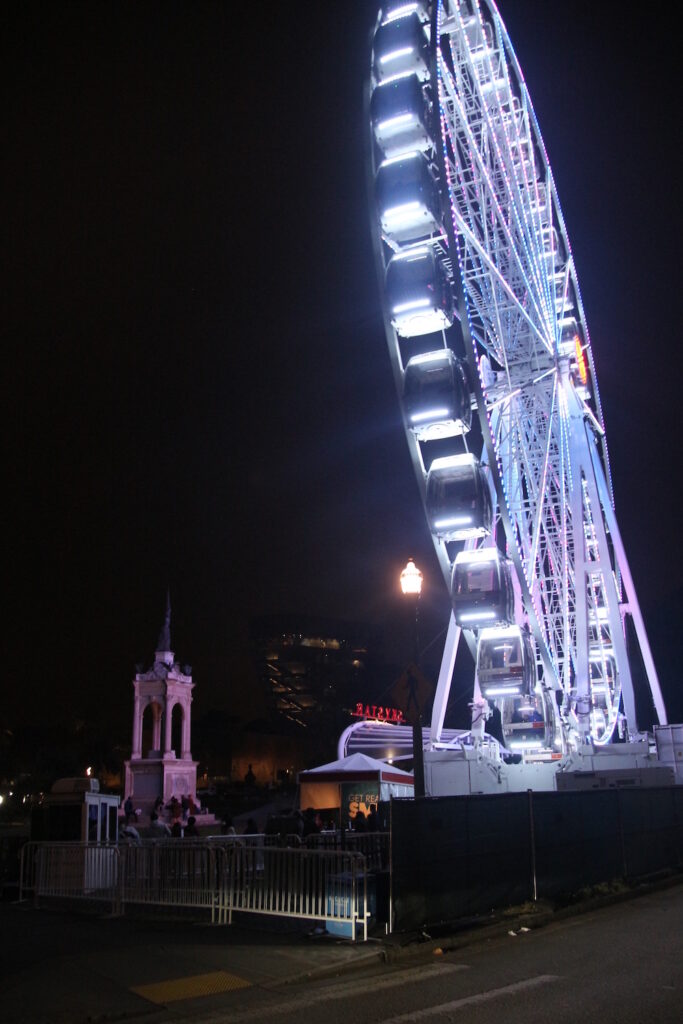The Board of Supes, after a pretty weird discussion, failed today to block a five-year contract for the Golden Gate Park Ferris Wheel – or maybe they didn’t.
Everyone on the board seemed to agree that this is not the most important topic at a time when the city is still under COVID lockdown, people are dying, homelessness is growing, and kids aren’t back in school.
And some, like Sup. Hillary Ronen, said that in these bleak times, something that offers fun for kids is important. (I agree – my kids are off at college, but if they were still young, that ride would be a godsend, a diversion. You can only take so many hikes and bike trips to the park before they get bored.)

But there are a couple of larger issues at hand – and one complicated bit of city law.
Sup. Connie Chan said she hadn’t even seen a final contract for the deal, between the Recreation and Parks Department and a private company based in St. Louis.
Sup. Aaron Peskin said the company running the wheel was owned by family of the Koch Brothers, who clearly don’t need any money from San Francisco. And the first at least $200,000 of the revenue the city will get goes to a private nonprofit linked to the ongoing corruption investigations.
(UPDATE: Nick Gass, who works for Koch Industries, sent me the following: “To be clear, there is no familial relationship between the family that owns Koch Development (and thus SkyStar) and the family that owns Koch Industries (my employer).”)
“The contract does not exist,” Chan said. “It’s just a series of permits.” She noted that “corrupt government hurts all of us.”
Peskin: “This whole thing is funky from top to bottom.”
Yes, it is, and the Rec-Park director loves to find ways to monetize (that is, privatize) the parks. This is a $25 ride (with some free tickets to low-income kids); Sup. Shamann Walton said that a public attraction in a public park “should be free.”
There’s no question that the City Charter says the supervisors need to approve, by a two-thirds vote, any new “structure” in Golden Gate Park. But the City Attorney’s Office is arguing that the wheel is only temporary – albeit for five years – and so doesn’t count as a new “structure.”
(Weird role for the city attorney – the office represents Rec-Park, which says the wheel isn’t a structure, and some of the supes, who say it is. And the City Attorney’s Office isn’t the state Supreme Court, and its advice is only that – advice.)
Peskin argued that the wheel has a big concrete base that will not be taken away when the ride leaves, and that’s clearly a “structure.”
The only time I can find that anyone actually defined “structure” was in 2005, when the Planning Commission weighed on landmarks in the GGP concourse.
“Permanent signs,” the commission (no doubt with city attorney advice) determined, were those that would be in place for more than three months. “Temporary” installations were those that included “movable furniture, tents, temporary art installations, and portable performance stages.”
More: Chan noted that by the time this five-year deal is done, the money to the private company will exceed $1 million – and by law, no department can enter into a contract worth more than $1 million without board approval.
Sup. Dean Preston noted that he’s seen examples of city departments trying to find ways to manipulate contracts to avoid board approval. And, he said, Rec-Park could have made a better effort to reach out to Chan – it’s in her district – and agreed to more oversight.
The supes who wanted to support the wheel – and keep if there for four more years – had this possible bind. If they voted against the Chan resolution, which would approve the deal for another year, then Peskin argued they were voting against any authorization of the contract. “If you vote no, and two-thirds of the members don’t approve, then the authority (to allow the wheel) has not been granted,” he said.
The measure went down, 5-6, with Sups. Walton, Chan, Gordon Mar, Peskin, and Preston in favor.
So what happens now? The wheel probably stays where it is, since the city attorney and the mayor are on the side of the installation. (Unless somebody sues, which is highly unlikely and would involve a whole lot of money and effort on all sides).
But the Ferris Wheel has created an important debate that needs to continue, and probably will require a new look at the City Charter (long overdue anyway). Right now, the Mayor’s Office has far more authority than the district-elected supervisors, and departments under the mayor can approve contracts without adequate public oversight.
Maybe the next step is a Charter Reform working group and a hard look at accountability, corruption, and who runs the city.







